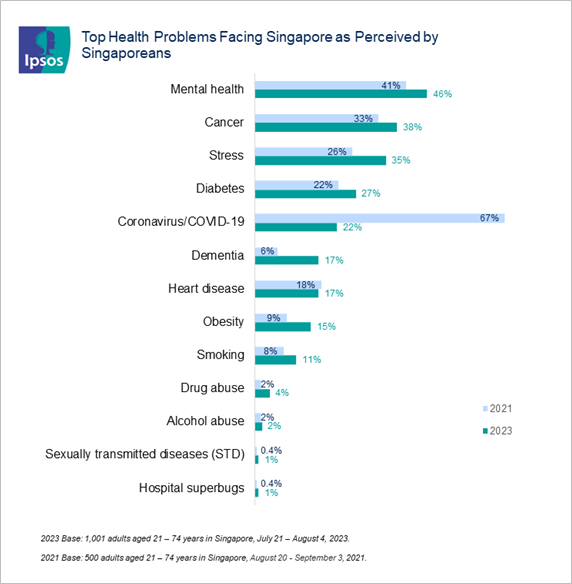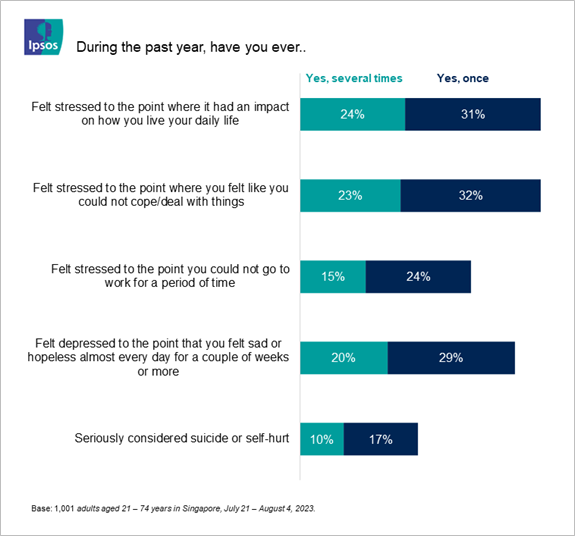Singaporeans deem mental health as the biggest health problem
The Ipsos World Mental Health Day survey explores changes in how people feel about their own mental health, the factors that are impacting their mental wellbeing, and sets this against the backdrop of the broader healthcare environment.
As Ipsos' Global Health Service Monitor shows, mental health is now the number one concern when Singaporeans and people around the world are asked about the main healthcare problems facing their country. This study explore the issures in more detail.
Singaporeans' Top Health Concern - Mental Health
Close to half (46%) of Singaporeans place mental health as the biggest health problem facing the country today, followed by cancer (38%) and stress (35%). Mental health has pushed COVID-19 from the top concern identified in the 2021 survey, while stress has moved up from fourth into the third biggest concern.

Mental Health vs Physical Health
Nearly 8 in 10 Singaporeans (78%) think their mental health is as important as their physical health. But just slightly over half (54%) say mental and physical health are treated equally by the Singapore's healthcare system, an increase of 11% from 2021.
Singaporeans are more likely to say they often think about their physical health (66%), compared to 52% who say they often think about their mental wellbeing. The latter is one that is more practiced by women (56%) than men (48%), and more so for adults below the age of 35 (64%). Conversely, 44% of Singaporeans say they never or don't think very much about their mental wellbeing.
Mental Health Impacts
More than half (55%) of Singaporeans say that they have felt stressed to the point where it had an impact on how they lived their daily lives at least once in the past year, with about a quarter of Singaporeans (24%) saying it has happened several times. Around the same (23%) number of people also say that, on several occasions in the last 12 months, they felt so stressed that they could not cope or deal with things. Thirty-nine percent say they had to take time off work due to stress in the last year, with 15% saying they had to do this on multiple occasions.
Close to half of Singaporeans (49%) reported feeling depressed to the point that they felt sad or hopeless almost every day for weeks at a time. 20% say they have felt this way on multiple occasions in the past year.
27% have seriously considered suicide or self-hurt at least once in the past year. 26% of those under 35 have considered it once; and 10% of Singaporeans say they have considered it several times in the past year.

Melanie Ng, Director, Public Affairs, Ipsos in Singapore said: "Our recent Ipsos Global Health Service Monitor finds mental health and stress occupying two of the top three places when it comes to the healthcare priorities facing Singapore. This new World Mental Health Day research illustrates the impact stress is having on Singaporeans' day-to-day lives, with more than half saying they have experienced periods over the last year where they couldn't cope due to stress.
Singaporeans believe that mental health is as important as their physical health, but they feel that the country's healthcare system does not reflect that equal importance and needs to do more to catch up.
The percentage of Singaporeans feeling the impact of stress on their daily lives have decreased only marginally since COVID-19 became endemic, but the effects remain high and concerning. One in five Singaporeans experience depression regularly, and one in ten has considered self-harm. These figures are worrying because they continue to remain high despite greater awareness for self-care and community support.
Quite a considerable population of Singaporean admit to seldom or never focusing on their mental wellbeing, a tendency that may be attributed to the high-stress, relentless rhythm or life in Singapore. Nonetheless, it is indisputable that employers, governmental bodies, and communities must heighten their commitment towards enhancing preventative mental health care."



